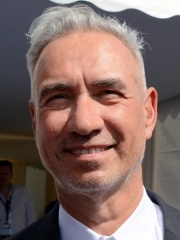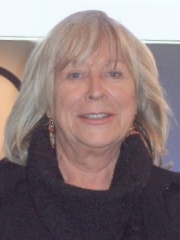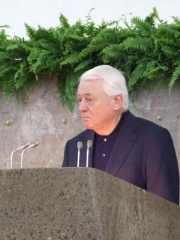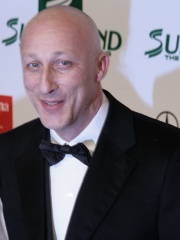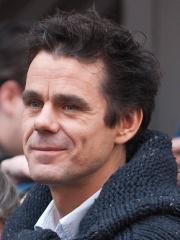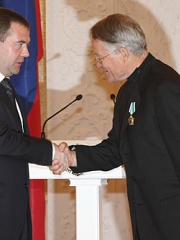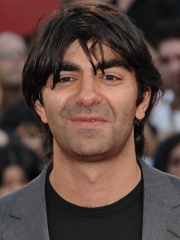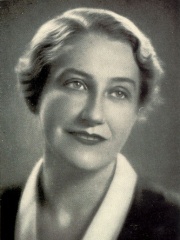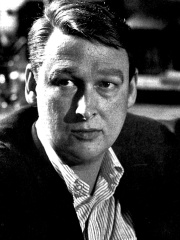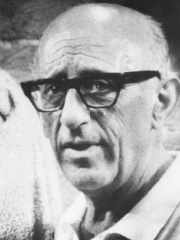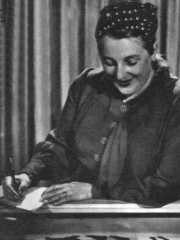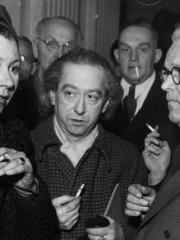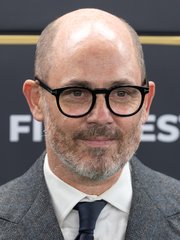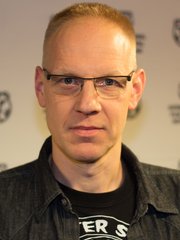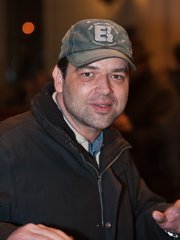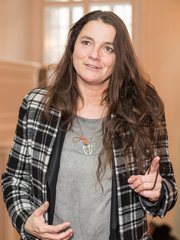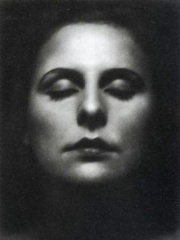
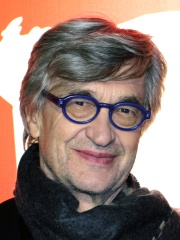
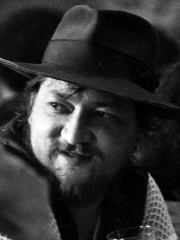
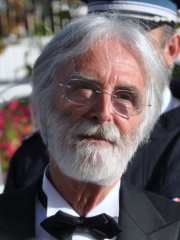
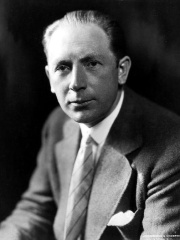
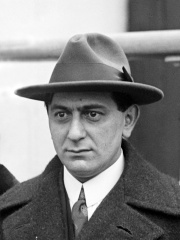
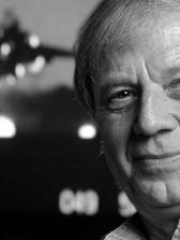
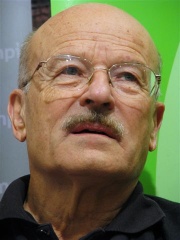
The Most Famous
FILM DIRECTORS from Germany
This page contains a list of the greatest German Film Directors. The pantheon dataset contains 2,041 Film Directors, 90 of which were born in Germany. This makes Germany the birth place of the 5th most number of Film Directors behind United Kingdom, and Italy.
Top 10
The following people are considered by Pantheon to be the top 10 most legendary German Film Directors of all time. This list of famous German Film Directors is sorted by HPI (Historical Popularity Index), a metric that aggregates information on a biography's online popularity. Visit the rankings page to view the entire list of German Film Directors.

1. Leni Riefenstahl (1902 - 2003)
With an HPI of 78.74, Leni Riefenstahl is the most famous German Film Director. Her biography has been translated into 80 different languages on wikipedia.
Helene Bertha Amalie "Leni" Riefenstahl (German: [ˈleːniː ˈʁiːfn̩ʃtaːl] ; 22 August 1902 – 8 September 2003) was a German filmmaker, photographer, and actress. She is considered one of the most controversial personalities in film history. Regarded by many critics as an "innovative filmmaker and creative aesthete", she is also criticized for her works in the service of propaganda during the Nazi era. A talented swimmer and an artist, Riefenstahl became interested in dancing during her childhood, taking lessons and performing across all Europe. After seeing a promotional poster for the 1924 film Mountain of Destiny, she was inspired to move into acting and between 1925 and 1929 starred in five successful motion pictures. Riefenstahl became one of the few women in Germany to direct a film during the Weimar era when, in 1932, she decided to try directing with her own film, The Blue Light. In the 1930s, she directed the Nazi propaganda films Triumph of the Will (1935) and Olympia (1938), resulting in worldwide attention and acclaim. The films are widely considered two of the most effective and technically innovative propaganda films ever made. Her involvement in Triumph of the Will, however, significantly damaged her career and reputation after World War II. Adolf Hitler closely collaborated with Riefenstahl during the production of at least three important Nazi films, and they formed a friendly relationship. After the war, Riefenstahl was arrested and found to be a Nazi "fellow traveller" but was not charged with war crimes. Throughout her later life, she denied having known about the Holocaust, and was criticized as the "voice of the 'how could we have known?' defence." Riefenstahl's postwar work included her autobiography and two photography books on the Nuba peoples of southern Sudan.

2. Wim Wenders (b. 1945)
With an HPI of 76.64, Wim Wenders is the 2nd most famous German Film Director. His biography has been translated into 63 different languages.
Wim Wenders (German: [ˈvɪm ˈvɛndɐs]; born Ernst Wilhelm Wenders; 14 August 1945) is a German filmmaker and photographer, who is a major figure in New German Cinema. Among the honors he has received are prizes from the Cannes, Venice, and Berlin film festivals. He has also received a BAFTA Award and been nominated for three Academy Awards and a Grammy Award. Wenders made his feature film debut with Summer in the City (1970). He earned critical acclaim for directing the films Alice in the Cities (1974), The Wrong Move (1975), and Kings of the Road (1976), later known as the Road Movie trilogy. Wenders won the BAFTA Award for Best Direction and the Palme d'Or for Paris, Texas (1984) and the Cannes Film Festival Best Director Award for Wings of Desire (1987). His other notable films include The American Friend (1977), Faraway, So Close! (1993), and Perfect Days (2023). Wenders has received three nominations for the Academy Award for Best Documentary Feature: for Buena Vista Social Club (1999), Pina (2011), and The Salt of the Earth (2014). He received a nomination for the Grammy Award for Best Long Form Music Video for Willie Nelson at the Teatro (1998). He is also known for directing the documentaries Tokyo-Ga (1985), The Soul of a Man (2003), Pope Francis: A Man of His Word (2018), and Anselm (2023). Wenders formerly served as the president of the European Film Academy from 1996–2020. He also earned an Honorary Golden Bear in 2015. He is an active photographer, emphasizing images of desolate landscapes. He is considered an auteur director.

3. Rainer Werner Fassbinder (1945 - 1982)
With an HPI of 74.27, Rainer Werner Fassbinder is the 3rd most famous German Film Director. His biography has been translated into 59 different languages.
Rainer Werner Fassbinder (German: [ˈʁaɪnɐ ˈvɛʁnɐ ˈfasbɪndɐ] ; 31 May 1945 – 10 June 1982), sometimes credited as R. W. Fassbinder, was a German filmmaker, dramatist and actor. He is widely regarded as one of the major figures and catalysts of the New German Cinema movement. He directed over 40 films that span a variety of genres; frequently his work blends elements of Hollywood melodrama with social criticism and avant-garde techniques. His films, according to him, explored "the exploitability of feelings". His work was deeply rooted in post-war German culture: the aftermath of Nazism, the German economic miracle and the Red Army Faction. He worked with a company of actors and technicians who frequently appeared in his projects. Fassbinder began leading the acting troupe Anti-Theater in 1967, with whom he staged some of his earliest productions. His first feature-length film was a gangster movie called Love Is Colder Than Death (1969); he scored his first domestic commercial success with The Merchant of Four Seasons (1972) and his first international success with Ali: Fear Eats the Soul (1974), both of which are considered masterpieces by contemporary critics. Big-budget projects such as Despair (1978), Lili Marleen and Lola (both 1981) followed. His greatest success came with The Marriage of Maria Braun (1979), chronicling the rise and fall of a German woman in the wake of World War II. Other notable films include the lesbian chamber drama The Bitter Tears of Petra von Kant (1972), Fox and His Friends (1975), Satan's Brew (1976), In a Year of 13 Moons (1978) and Querelle (1982), all of which dealt with homoerotic themes. He also directed the TV series World on a Wire (1973) and Berlin Alexanderplatz (1980). Fassbinder died on 10 June 1982, aged 37, from a lethal cocktail of cocaine and barbiturates. His career lasted less than two decades, but he was extremely prolific; between 1967 and 1982, he completed over 40 feature films, 24 plays, two television serials, three short films and four video productions, winning five of the most prestigious prizes for feature film in Germany, including the Golden Bear and multiple German Film Awards. His premature death is often considered the end of the New German Cinema timeframe.

4. Michael Haneke (b. 1942)
With an HPI of 73.07, Michael Haneke is the 4th most famous German Film Director. His biography has been translated into 58 different languages.
Michael Haneke (German: [ˈhaːnəkə]; born 23 March 1942) is a German-born Austrian film director and screenwriter. His work often examines social issues and depicts the feelings of estrangement experienced by individuals in modern society. Haneke has made films in French, German, and English and has worked in television and theatre. He also teaches film direction at the Film Academy Vienna. Haneke's first films were a trilogy, consisting of The Seventh Continent (1989), Benny's Video (1992), and 71 Fragments of a Chronology of Chance (1994), each of which depict a "coldly bureaucratic society in which genuine human relationships have been supplanted by a deep-seated collective malaise" and explore "the relationship among consumerism, violence, mass media, and contemporary alienation". He went on to win the Cannes Film Festival's Grand Prix for The Piano Teacher (2001) as well as its Palme d'Or twice, for The White Ribbon (2009) and Amour (2012), the latter of which received five Academy Award nominations and won the Academy Award for Best Foreign Language Film. He also directed Funny Games (1997) and its 2007 remake, Code Unknown (2000), Time of the Wolf (2003), Caché (2005), and Happy End (2017).

5. Werner Herzog (b. 1942)
With an HPI of 72.82, Werner Herzog is the 5th most famous German Film Director. His biography has been translated into 67 different languages.
Werner Herzog (German: [ˈvɛʁnɐ ˈhɛʁtsoːk]; né Stipetić; born 5 September 1942) is a German filmmaker, actor, opera director, and author. Regarded as a pioneer of New German Cinema, his films often feature ambitious protagonists with impossible dreams, people with unusual talents in obscure fields, or individuals in conflict with nature. His style involves avoiding storyboards, emphasizing improvisation, and placing his cast and crew into real situations mirroring those in the film on which they are working. In 1961, when Herzog was 19, he started work on his first film, Herakles. He has since produced, written, and directed the feature films Aguirre, the Wrath of God (1972), The Enigma of Kaspar Hauser (1974), Heart of Glass (1976), Stroszek (1977), Nosferatu the Vampyre (1979), Fitzcarraldo (1982), Cobra Verde (1987), Invincible (2001), and Bad Lieutenant: Port of Call New Orleans (2009) as well as the documentary films Lessons of Darkness (1992), Little Dieter Needs to Fly (1997), My Best Fiend (1999), Grizzly Man (2005), Encounters at the End of the World (2007), Cave of Forgotten Dreams (2010), and Into the Abyss (2011). He has also published over 12 books of prose and directed many operas. French filmmaker François Truffaut once called Herzog "the most important film director alive". American film critic Roger Ebert said that Herzog "has never created a single film that is compromised, shameful, made for pragmatic reasons, or uninteresting. Even his failures are spectacular". He was named one of the world's 100 most influential people by Time in 2009.

6. F. W. Murnau (1888 - 1931)
With an HPI of 72.18, F. W. Murnau is the 6th most famous German Film Director. His biography has been translated into 48 different languages.
Friedrich Wilhelm Murnau (from 1910; born Friedrich Wilhelm Plumpe; 28 December 1888 – 11 March 1931) was a German film director, producer, and screenwriter. He is regarded as one of cinema's most influential filmmakers for his work in the silent era. An erudite child with an early interest in film, Murnau eventually studied philology and art before director Max Reinhardt recruited him to his acting school. During World War I, he served in the Imperial German Army, initially as an infantry company commander and communications officer and later with the German Army's Flying Corps as an observer/gunner. He survived several crashes without any severe injuries. Murnau's first directorial work premiered in 1919, but he did not attain international recognition until the 1922 film Nosferatu, an adaptation of Bram Stoker's 1897 novel Dracula. Although not a commercial success owing to copyright issues with author Stoker's estate, the film is considered a masterpiece of German Expressionist cinema and an early cult film. Murnau later directed the film The Last Laugh (1924), as well as a 1926 interpretation of Goethe's Faust. He immigrated to Hollywood in 1926, where he joined the Fox Studio and made three films: Sunrise (1927), 4 Devils (1928) and City Girl (1930). Sunrise has been regarded by critics and film directors as among the best films ever made. Murnau travelled to Bora Bora to make the film Tabu (1931) with documentary film pioneer Robert J. Flaherty, although disputes with Flaherty led Murnau to finish the film on his own. A week before the successful opening of Tabu, Murnau died in a California hospital from injuries sustained in an automobile crash. Of the 21 films Murnau directed, eight are now considered to be completely lost. One reel of his feature Marizza, genannt die Schmuggler-Madonna survives. This leaves only 12 films surviving in their entirety.

7. Ernst Lubitsch (1892 - 1947)
With an HPI of 71.56, Ernst Lubitsch is the 7th most famous German Film Director. His biography has been translated into 51 different languages.
Ernst Lubitsch (; January 29, 1892 – November 30, 1947) was a German and American film director, producer, writer, and actor. His urbane comedies of manners gave him the reputation of being Hollywood's most elegant and sophisticated director; as his prestige grew, his films were promoted as having "the Lubitsch touch". Among his best known works are Trouble in Paradise (1932), Design for Living (1933), Ninotchka (1939), The Shop Around the Corner (1940), To Be or Not to Be (1942) and Heaven Can Wait (1943). He was nominated for the Academy Award for Best Director three times, for The Patriot (1928), The Love Parade (1929), and Heaven Can Wait (1943); his pictures The Smiling Lieutenant and One Hour with You were also nominated for Outstanding Production in 1932. In 1946, he received an Honorary Academy Award for his distinguished contributions to the art of the motion picture.

8. Wolfgang Petersen (1941 - 2022)
With an HPI of 71.17, Wolfgang Petersen is the 8th most famous German Film Director. His biography has been translated into 51 different languages.
Wolfgang Petersen (14 March 1941 – 12 August 2022) was a German film and television director, screenwriter and producer. His international breakthrough was the war film Das Boot (1981), which earned him Academy Award nominations for Best Director and Best Adapted Screenplay. He subsequently directed the blockbuster fantasy film The NeverEnding Story (1984), based on the 1979 novel of the same name. After moving to the United States in the mid-1980s, Petersen directed his first American production, the science-fiction film Enemy Mine (1985). He directed a variety of major studio productions through the mid-2000s, including In the Line of Fire (1993), Outbreak (1995), Air Force One (1997), The Perfect Storm (2000), Troy (2004) and Poseidon (2006). In addition to his Oscar nominations, Petersen won three Bambi Awards, a Bavarian Film Award and a German Film Award. He was also a founding member of the Deutsche Filmakademie.

9. Volker Schlöndorff (b. 1939)
With an HPI of 68.98, Volker Schlöndorff is the 9th most famous German Film Director. His biography has been translated into 37 different languages.
Volker Schlöndorff (German pronunciation: [ˈfɔlkɐ ˈʃløːndɔʁf] ; born 31 March 1939) is a German film director, screenwriter and producer who has worked in Germany, France and the United States. He was a prominent member of the New German Cinema of the late 1960s and early 1970s. He received an Oscar as well as the Palme d'Or at the 1979 Cannes Film Festival for The Tin Drum (1979), the film version of the novel by Nobel Prize-winning author Günter Grass.
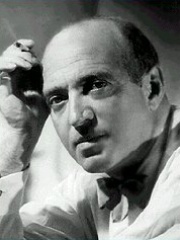
10. Max Ophüls (1902 - 1957)
With an HPI of 68.15, Max Ophüls is the 10th most famous German Film Director. His biography has been translated into 35 different languages.
Maximillian Oppenheimer (6 May 1902 – 26 March 1957), known as Max Ophüls (AW-fəlss or OH-fəlss), was a German and French film director, screenwriter and art director. He was known for his opulent and lyrical visual style, with heavy use of tracking shots, and his melancholic, romantic themes. The Harvard Film Archive has called Ophüls "a supreme stylist of the cinema and a master storyteller". A refugee from Nazi Germany, Ophüls worked in Germany (1931–33), France (1933–40 and 1950–57), and the United States (1947–50). He made nearly 30 films, the latter ones being especially notable: Letter from an Unknown Woman (1948), The Reckless Moment (1949), La Ronde (1950), Le Plaisir (1952), The Earrings of Madame de… (1953), and Lola Montès (1955).
People
Pantheon has 90 people classified as German film directors born between 1882 and 1976. Of these 90, 37 (41.11%) of them are still alive today. The most famous living German film directors include Wim Wenders, Michael Haneke, and Werner Herzog. The most famous deceased German film directors include Leni Riefenstahl, Rainer Werner Fassbinder, and F. W. Murnau. As of April 2024, 4 new German film directors have been added to Pantheon including Edward Berger, Jörg Buttgereit, and Marc Rothemund.
Living German Film Directors
Go to all RankingsWim Wenders
1945 - Present
HPI: 76.64
Michael Haneke
1942 - Present
HPI: 73.07
Werner Herzog
1942 - Present
HPI: 72.82
Volker Schlöndorff
1939 - Present
HPI: 68.98
Roland Emmerich
1955 - Present
HPI: 68.07
Margarethe von Trotta
1942 - Present
HPI: 67.54
Alexander Kluge
1932 - Present
HPI: 60.99
Oliver Hirschbiegel
1957 - Present
HPI: 60.97
Uli Edel
1947 - Present
HPI: 60.73
Tom Tykwer
1965 - Present
HPI: 60.43
Peter Stein
1937 - Present
HPI: 58.58
Fatih Akin
1973 - Present
HPI: 58.17
Deceased German Film Directors
Go to all RankingsLeni Riefenstahl
1902 - 2003
HPI: 78.74
Rainer Werner Fassbinder
1945 - 1982
HPI: 74.27
F. W. Murnau
1888 - 1931
HPI: 72.18
Ernst Lubitsch
1892 - 1947
HPI: 71.56
Wolfgang Petersen
1941 - 2022
HPI: 71.17
Max Ophüls
1902 - 1957
HPI: 68.15
Thea von Harbou
1888 - 1954
HPI: 66.08
Mike Nichols
1931 - 2014
HPI: 65.72
Douglas Sirk
1897 - 1987
HPI: 65.56
Robert Siodmak
1900 - 1973
HPI: 65.41
Lotte Reiniger
1899 - 1981
HPI: 63.71
Veit Harlan
1899 - 1964
HPI: 63.68
Newly Added German Film Directors (2025)
Go to all RankingsEdward Berger
1970 - Present
HPI: 56.07
Jörg Buttgereit
1963 - Present
HPI: 51.11
Marc Rothemund
1968 - Present
HPI: 44.82
Katja von Garnier
1966 - Present
HPI: 44.53
Overlapping Lives
Which Film Directors were alive at the same time? This visualization shows the lifespans of the 25 most globally memorable Film Directors since 1700.

